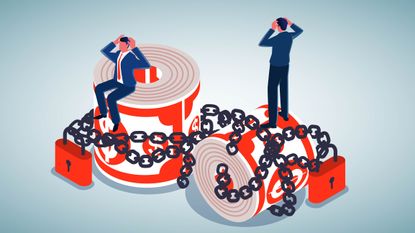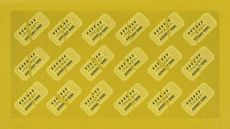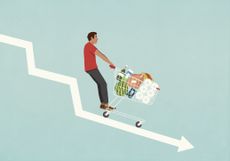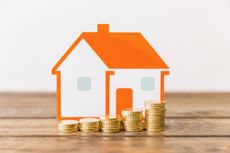What to do if your bank closes your account and how to avoid it
There are steps you can take to prevent the nightmare scenario of an unexpected closure


It sounds like a bad dream, but for some account holders it's actually happening. "Banks are evicting what appear to be an increasing number of individuals, families and small-business owners," according to The New York Times — and "often, they don't have the faintest idea why their banks turned against them."
Unexpected account closures can lead to myriad issues. While sometimes you'll get a letter notifying you that your account is being closed, if you don't (or you don't see it), you might "discover that [your] accounts no longer work while [you're] at the grocery store, rental car counter or A.T.M.," said the Times. In turn, you might not be able to pay your bills on time, which can negatively impact your credit score, or for small businesses, making payroll might be tough.
Why would a bank close your account?
There are a number of reasons that a bank might close your account:
Subscribe to The Week
Escape your echo chamber. Get the facts behind the news, plus analysis from multiple perspectives.

Sign up for The Week's Free Newsletters
From our morning news briefing to a weekly Good News Newsletter, get the best of The Week delivered directly to your inbox.
From our morning news briefing to a weekly Good News Newsletter, get the best of The Week delivered directly to your inbox.
- You haven't used your account much in several years.
- You have a zero or negative balance.
- You've frequently bounced checks or overdrafted your account.
- You've made too many transfers.
- You have what the bank considers a high-risk occupation (per Forbes, this may include "gun sales, marijuana sales, online gambling or escort services.")
- You've had a previous criminal conviction that you didn't report to your bank, or you were convicted after you opened your account.
- Your bank thinks you're the victim of identity theft.
- Your bank has noted suspicious or potentially illegal activity.
- Your bank has made changes, such as closing branches or stopping business in your state.
What happens if your bank does close your account?
"If a bank closes your account, it isn’t required to notify you, so you might not receive a notification informing you of the closure," reported CNBC Select, but it "is required to return any money that may have been in the account." The only exception here is if "the bank suspects terrorism or other illegal activities," per Time. But in other cases, you can expect to get a check in the mail or see a deposit in another account with the bank.
Additionally, per Time, "your account may be frozen," which means that "debits will be blocked and deposits won't make it in." Know that while an account closure "typically doesn't have a direct impact on your credit score (like, say, having your credit card closed on you), it could become a problem if your account has any outstanding balances, such as unpaid overdraft fees," CNBC Select explained.
How can you prevent your bank from closing your account?
If all of the above sounds like a nightmare to deal with, luckily there are steps you can take to avoid an unexpected closure:
- Handle checks with caution. As The New York Times explained, "fraud involving mail theft and checks has roughly doubled in recent years," which has meant that banks "have turned up the dials on their check-fraud algorithms." You can avoid an account closure for this reason by avoiding check fraud altogether. To do this, avoid mailing checks (and if you do, take them "directly to a post office," suggested the Times), and also "try not to accept a check from individuals you don't know, in case they are trying to rip you off," advised the Times.
- Stay in communication with your bank. While your bank's customer service might not be that helpful after your account is already closed, staying in touch while your account is open can prevent a closure. According to the Times, it can pay off to answer your bank's calls and emails and to let them know in advance if you're making any big financial moves, such as a notable lifestyle shift or a home sale.
- Sign up for alerts and notifications. Per CNBC Select, you can "lessen the risk of your account being closed" by monitoring your account balance and enrolling in notifications to know if it falls below a certain amount or when certain transactions or deposits occur. You might consider linking your account to another so funds are transferred in if your balance gets too low.

Continue reading for free
We hope you're enjoying The Week's refreshingly open-minded journalism.
Subscribed to The Week? Register your account with the same email as your subscription.
Sign up to our 10 Things You Need to Know Today newsletter
A free daily digest of the biggest news stories of the day - and the best features from our website
Becca Stanek has worked as an editor and writer in the personal finance space since 2017. She previously served as a deputy editor and later a managing editor overseeing investing and savings content at LendingTree and as an editor at the financial startup SmartAsset, where she focused on retirement- and financial-adviser-related content. Before that, Becca was a staff writer at The Week, primarily contributing to Speed Reads.
-
 5 X-plosive cartoons about Elon Musk
5 X-plosive cartoons about Elon MuskCartoons Artists take on his proposed clean-up of X, his views on advertisers, and more
By The Week US Published
-
 2023: the year of superhero fatigue
2023: the year of superhero fatigueThe Explainer The year may represent the end of an era for Hollywood
By Brendan Morrow, The Week US Published
-
 Recipe: roast garlic mushrooms with parsley and eggs by Gelf Alderson
Recipe: roast garlic mushrooms with parsley and eggs by Gelf AldersonThe Week Recommends A simple and classic breakfast combination
By The Week UK Published
-
 6 tips to shop online safely this holiday season
6 tips to shop online safely this holiday seasonThe Explainer Lower the chances of credit card fraud spoiling your holidays
By Becca Stanek, The Week US Published
-
 Renting a car this holiday season? 5 tips to keep in mind
Renting a car this holiday season? 5 tips to keep in mindThe Explainer From filling the tank yourself to using your own insurance, here's how to save on car rentals
By Becca Stanek, The Week US Published
-
 Prices are going down. Here's where you can see the difference.
Prices are going down. Here's where you can see the difference.The Explainer 'An era of price hikes is fading,' but that doesn't mean prices will all come down
By Becca Stanek, The Week US Published
-
 6 ways your local library can save you money
6 ways your local library can save you moneyThe Explainer 'Before you buy something, see if you can borrow it from the library'
By Becca Stanek, The Week US Published
-
 Guide to holiday season tipping: Who to tip and how much to give
Guide to holiday season tipping: Who to tip and how much to giveThe Explainer It's time to start making your list and checking it twice
By Becca Stanek, The Week US Published
-
 5 tips for giving to charity this holiday season
5 tips for giving to charity this holiday seasonThe Explainer By being strategic about your gifting, you can maximize the impact of the donations you make this year
By Becca Stanek, The Week US Published
-
 Why does it cost so much to sell a house?
Why does it cost so much to sell a house?The Explainer From staging to commission expenses, here's what to expect
By Becca Stanek, The Week US Published
-
 How to successfully navigate Black Friday
How to successfully navigate Black FridayThe Explainer Make sure you actually end up saving rather than overspending
By Becca Stanek, The Week US Published










